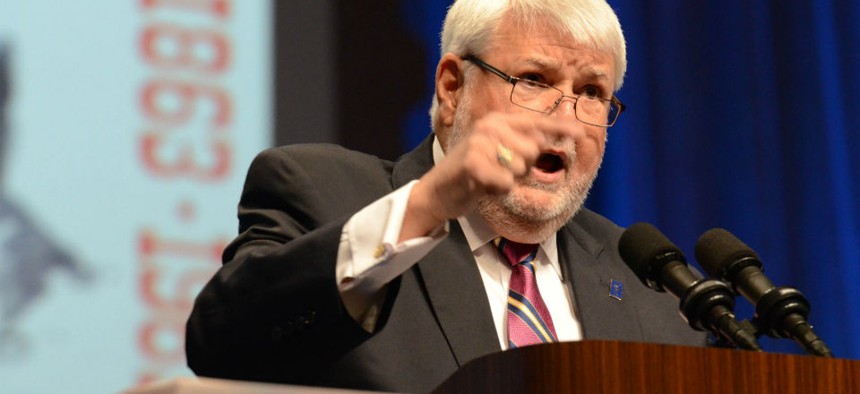
"We’re used to always being in the fight," AFGE President J. David Cox Sr. said. AFGE
Federal Employee Unions Expect a ‘Tough Two Years,’ But Promise to Fight On
Republican-controlled Congress poses a threat to agency budgets and employee benefits.
Federal employee advocates on Wednesday conveyed significant concern with the major Republican gains made in Tuesday’s midterm election, but vowed to continue to work with both parties to pursue the interests of the federal workforce.
Unions representing federal workers expressed their resignation toward a “tough two years” coming up for their members, and conceded the election results were not their preferred results. The labor groups promised to fight any efforts to cut pay, benefits or agency budgets.
“Last night certainly didn’t go the way we had hoped,” J. David Cox, national president of the American Federation of Government Employees -- which saw just three of its 14 endorsed Senate candidates claim victories Tuesday -- told reporters. “But we are not mourning here at AFGE today.”
First and foremost on the agenda for federal workforce advocates is boosting agency funding. Cox vowed to end sequestration, while National Treasury Employees Union National President Colleen Kelley said her members will push for budget increases during the lame duck session of Congress.
“Severe budget cuts have resulted in staffing shortages, insufficient training and a reduction in services to the public,” Kelley said.
Cox added public backlash against federal employees is often misguided.
“When people get mad at government employees,” he said, “they’re really mad the government programs aren’t properly funded.”
The current resolution keeping agencies open is set to expire Dec. 11.
With frozen pay or historically small raises, furloughs and slashed budgets from sequestration, pension contribution hikes, a government shutdown, legislative proposals to cut benefits and loosen job security and countless examples of disparaging rhetoric, federal employees have faced repeated attacks from Congress since Republicans took control of the House in 2010. Their unions lamented things will not likely get better now that the party typically behind those attacks controls both chambers of Congress.
“The last few years have been challenging ones for the federal workforce and I expect they will remain so,” Kelley said. However, she said electoral disappointments will not stop her members from advancing their causes.
The unions vowed to work with lawmakers of all stripes to pursue those interests. In addition to agency funding, advocates said they will fight against the budget proposal put forward in the last two sessions of Congress by Rep. Paul Ryan, R-Wis., which would, among other things, once again make federal employees pay more for their retirement pensions and shrink the overall size of the federal workforce. The concerns about changes to the Federal Employees Retirement System were compounded by a recent letter from Ryan and Rep. Darrell Issa, R-Calif., asking the Congressional Budget Office to evaluate a series of proposals to overhaul the benefit program.
Union leaders said the shift in Senate power will not affect their advocacy, noting they have friends on both side of the aisle.
“It’s not about what political party the lawmakers belong to,” National Federation of Federal Employees President Bill Dougan told Government Executive on Tuesday. “It’s about passing legislation important to our members.”
Cox said that while the deck may be stacked against him and his members, the situation is nothing new.
“We’re union folks,” he said. “We’re used to always being in the fight.”
NEXT STORY: 10 Races for Feds to Watch: The Results







